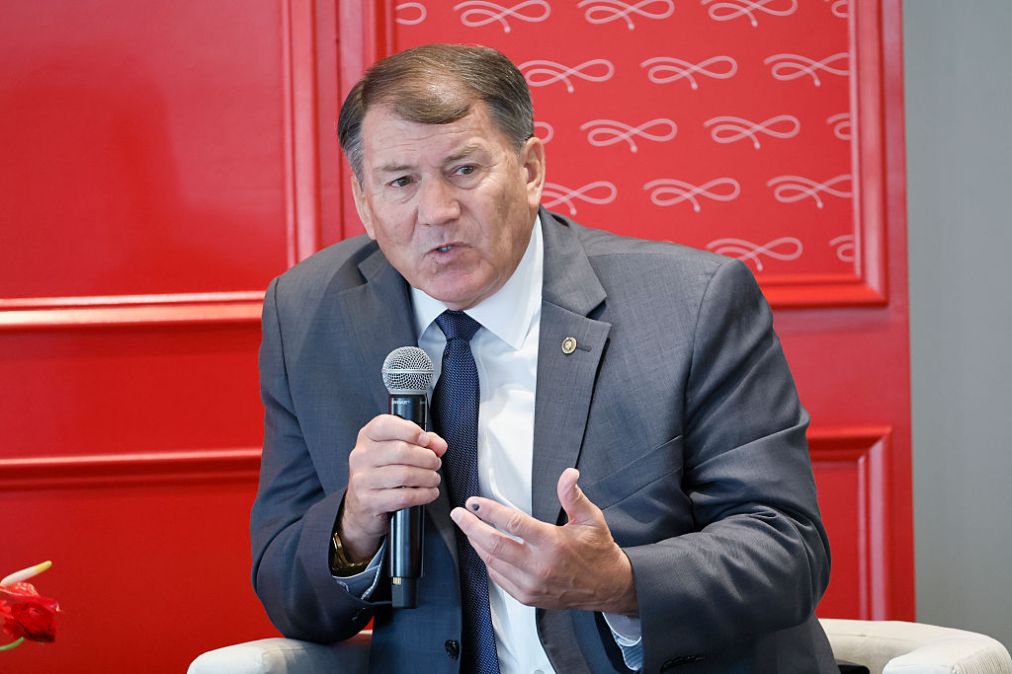GOP senator: Legal immigration is ‘critical’ to US success in AI race

Winning the artificial intelligence race against China will require expanded manufacturing fueled in no small part by legal immigration, the Republican co-chair of the Senate AI Caucus said Wednesday.
Appearing at a Siemens-Widehall event in Washington, D.C., Sen. Mike Rounds said China has roughly four times more power production than the United States, a metric crucial for supporting AI data centers. If the U.S. has designs on catching up, the South Dakota Republican made the case that it can only be done with more investments in manufacturing and a labor force that includes more foreign-born workers.
“Anybody that thinks that AI is going to take jobs away, I’m sorry, it will change the types of jobs, but you’re going to need more people here, and we will not fill those positions just with our natural-born workforce,” Rounds said. “Sometimes, [it’s] not popular to say it, but legal immigration is critical to the success of this country, long term. We’ve got to be able to bring in the best and the brightest who want to see the American dream. We’ve got to have a legal immigration system that allows that to happen.”
Rounds’ position on immigration makes him an outlier in the current iteration of his party — he called it a “challenging subject” while discussing declining U.S. birth rates and the need for more young people to fill electrician, plumbing and manufacturing-related positions.
But there also needs to be a commitment from industry, Rounds said, to make sure that young Americans have the proper training for AI jobs and aren’t shut out of the workforce — no small feat given some informed predictions that the technology could wipe out half of all entry-level white-collar jobs in the years ahead.
“We’ve got to have a coordinated effort where businesses are recognizing their demand over the next” several years and partnering with institutions on training, Rounds said. Industry should be able to clearly inform those training partners what they need in terms of labor to ensure students aren’t working toward certificates or degrees in increasingly irrelevant disciplines, he added.
“AI is going to require more people working in the United States, not less,” Rounds said. “I know there’s people out there that are afraid about losing jobs. I’m just telling you, I don’t believe we’re going to lose jobs. We may lose lower-skilled jobs, but the job of a business person is to take that person that was in that lower-skilled job and to help them become a more skilled person and to put them back to work again.”
Rounds’ comments came a day after Amazon announced it would cut 14,000 corporate jobs, part of the e-commerce giant’s broader AI push. Speaking later at the event, Rep. Bill Foster, D-Ill., mused that Amazon is “not unique” in this regard, giving an impression that “the idea of going into middle management as a ticket to the middle class is not assured.”
Foster, a former House AI task force member and high-energy physicist, said the workforce changes brought by AI make it “essential” to change the country’s social contract. He previously expressed interest in universal basic income and now sees the best chance for a redistribution of wealth — amid an increasingly widening income gap — through guaranteed health care. The challenge is to not “destroy individual incentive,” Foster added, though Canadians have shown that they “still want to compete.”
But with the “lion’s share of the economic rewards” going to the people at “the very top levels of the technology stack,” Foster said it’s imperative that something changes and American workers don’t get left even further behind.
“If Amazon did not cut their workforce, they would be suffering in competition from Walmart and everything else,” he said. “That is going to be the reality of living and it’s going to be really, really tough. I think if you had a better safety net when you have to do layoffs, I think that’s actually super important right now.”






